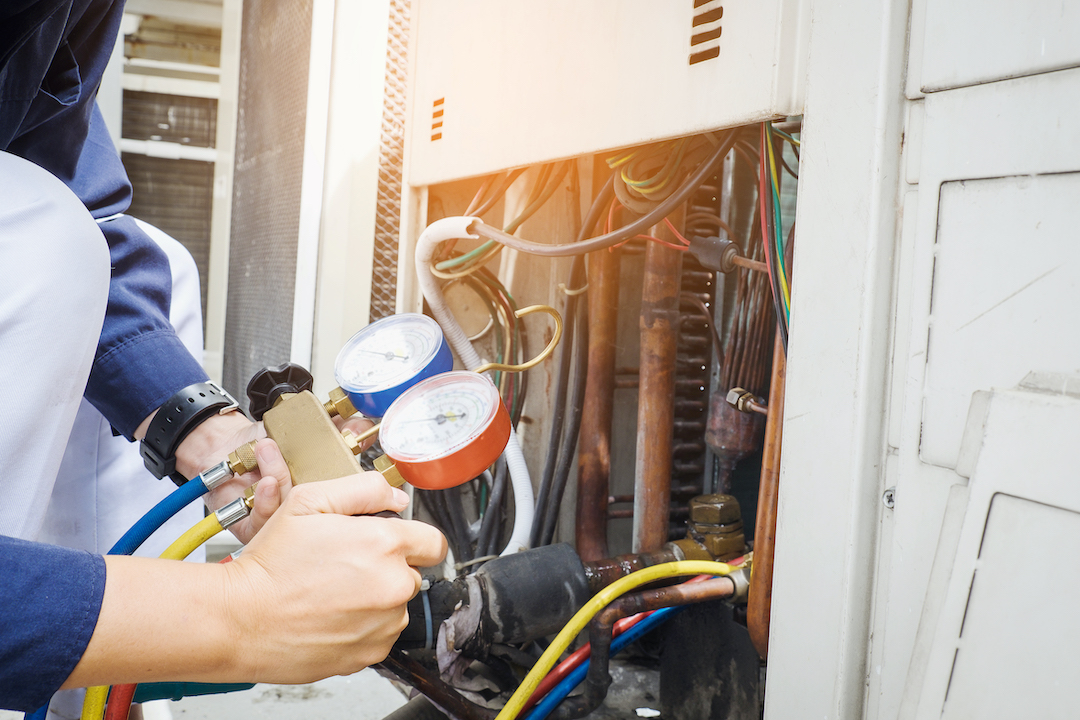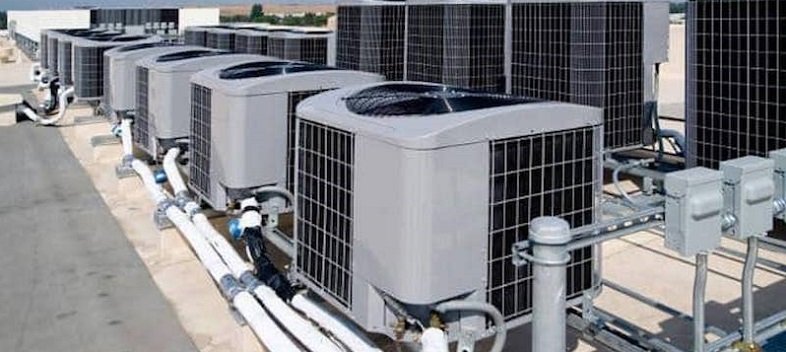Picking In Between a Warm Pump and Furnace: Key Factors To Consider for Your Heating And Cooling Needs
When evaluating home heating alternatives for heating and cooling needs, the choice in between a heat pump and a heater can be intricate. Each system provides distinctive benefits customized to certain climates and energy performance objectives. Comprehending these differences is important for making an informed selection. Secret factors such as installation expenses and ecological influence better complicate the selection procedure. Which option truly straightens with one's comfort and sustainability preferences? The adhering to sections will discover these considerations carefully.
Understanding Warmth Pumps: Exactly How They Function and Their Benefits
While lots of property owners consider various heating alternatives, understanding how warm pumps feature and their benefits can considerably influence their decision. Heatpump operate by transferring warmth as opposed to creating it. In the winter season, they remove warm from the outside air or ground and move it inside, while in the summer season, they reverse this procedure, cooling down the home by getting rid of heat outside. This double capability makes them flexible for year-round environment control.One of the key benefits of warmth pumps is their energy effectiveness. They make use of substantially much less electricity compared to traditional heating unit, possibly causing reduced utility bills (heat pump service). Furthermore, warmth pumps have a smaller carbon footprint, making them an ecologically friendly choice. They additionally call for much less maintenance than traditional systems, adding to long-lasting expense savings. Overall, recognizing the technicians and advantages of warm pumps can help house owners make educated decisions regarding their heating and cooling down demands
Discovering Furnaces: Types, Procedure, and Benefits
Heating systems are available in different types, including gas, electrical, and oil versions, each with distinctive functional systems. Comprehending these differences is important, as they impact efficiency and home heating efficiency. Additionally, furnaces offer countless advantages, such as constant heat result and reliability in colder environments.
Kinds of Heating systems
Heating systems can differ substantially in design and operation, with heaters being a prominent selection among home owners. There are numerous sorts of furnaces, each making use of various gas sources and technologies. Gas heaters are usual, leveraging natural gas to produce warmth effectively. Electric furnaces, on the other hand, make use of electrical resistance to generate heat, typically preferred for their straightforward installment. Oil furnaces, while less typical, are effective in locations with restricted gas access (furnace replacement). Additionally, condensing heaters make best use of energy performance by recording and recycling exhaust gases. Each kind operates via a system of warm exchangers and ductwork to distribute warm air throughout a home. Understanding the distinctions in between these furnace types is crucial for notified cooling and heating decisions
Benefits of Heaters
For property owners looking for trusted warmth during cool months, the benefits of heaters are significant. Furnaces provide constant home heating, making certain even temperatures throughout the home. They are especially effective in severe cold, commonly surpassing heat pumps in freezing conditions. Different types, including gas, electric, and oil heating systems, supply flexibility to meet diverse demands and preferences.Furnaces likewise have a tendency to have reduced preliminary setup expenses contrasted to warmth pumps, making them an extra accessible option for numerous. Their robust style adds to a much longer lifespan, with many units lasting over 15 years with appropriate upkeep. Additionally, modern-day heaters are frequently geared up with advanced modern technology for improved performance, which can bring about reduced power costs. Generally, heaters continue to be a trustworthy option for efficient home heating.

Power Efficiency: Contrasting Warm Pumps and Furnaces
When contrasting energy efficiency in between heatpump and heating systems, the Seasonal Power Performance Proportion (SEER) plays a vital duty in identifying efficiency. Additionally, a functional cost evaluation discloses the long-term financial implications of each system. Recognizing these factors can assist homeowners in making informed decisions regarding their home heating solutions.
Seasonal Energy Efficiency Ratio
Energy effectiveness plays a vital duty in the decision-making procedure in between warmth pumps and furnaces, particularly when thinking about the Seasonal Energy Effectiveness Ratio (SEER) This metric procedures the cooling performance of warmth pumps over an entire cooling period, giving a standardized means to review efficiency. Higher SEER scores indicate greater power performance, converting to reduced energy usage and reduced utility bills. In comparison, heating systems are normally assessed using the Yearly Fuel Application Performance (AFUE) rating, which reflects home heating performance. When contrasting these 2 systems, homeowners need to prioritize SEER ratings for heatpump, as they straight impact overall power financial savings and environmental sustainability. A thorough understanding of SEER can significantly influence the lasting complete satisfaction and cost-effectiveness of the chosen HVAC solution.
Functional Expense Analysis
Recognizing the functional expenses connected with heatpump and heaters is essential for homeowners reviewing their options. Heat pumps generally offer greater power efficiency, transforming electric energy into warm with minimal waste. This results in lower month-to-month energy expenses, especially in modest climates. Conversely, traditional heaters, particularly gas models, might have lower in advance costs yet can incur higher functional costs over time because of sustain rates and performance ratings.Moreover, heatpump can operate as both home heating and cooling down systems, possibly lowering the demand for separate a/c systems. While first investments for heatpump may be higher, their lasting financial savings in power performance can make them a much more cost-efficient choice for several families. Mindful evaluation of local energy rates is important to determine the best option.
Setup Expenses: What to Expect for every Home Heating System
Installment prices for heating unit can vary significantly in between warmth pumps and heating systems, affecting home owners' choices. Heatpump typically have higher in advance installment expenses, commonly varying from $3,500 to $8,000, depending on the unit size and complexity of setup. This includes the outside system, indoor handling system, and needed ductwork adjustments. Alternatively, heaters often tend to have reduced first expenses, averaging between $2,500 and $6,000, which can be appealing for budget-conscious property owners. Setup expenses can increase if extensive ductwork is required.Moreover, the selection of gas type for heating systems-- natural gas, gas, or electric-- can likewise impact installment expenses. While warmth pumps supply energy effectiveness, their preliminary investment might deter some buyers. Eventually, evaluating setup expenses together with long-term savings and effectiveness will certainly aid property owners in making notified decisions regarding their heating systems.
Environment Considerations: Which System Performs Better in Your Area
How do climate conditions affect the efficiency of furnace? The performance of warmth pumps and heating systems can vary substantially depending upon the regional environment. In modest climates, warmth pumps stand out by efficiently transferring warm from the outside air, making them an weblink energy-saving choice. Their performance lessens in incredibly chilly temperatures, where they may have a hard time to remove sufficient warm. Conversely, furnaces, particularly gas designs, give constant and trusted heat despite outdoor problems, making them more effective in cooler regions.In locations that experience milder winters, heatpump can operate effectively year-round, supplying both cooling and heating. On the other hand, areas with harsh winter seasons frequently take advantage of the toughness of heating systems. Eventually, understanding the regional environment is necessary when determining in between a heatpump and a heating system, as it directly influences their operational performance and total efficiency.
Maintenance Requirements: Long-Term Take Care Of Warmth Pumps vs. Furnaces
While both warm pumps and heating systems call for regular upkeep to ensure peak performance, their particular needs and treatment regimens differ considerably. Furnaces commonly require less best site frequent focus, with yearly inspections sufficing to look for gas leaks, tidy filters, and examine overall performance. Their easier design usually permits uncomplicated repairs.In contrast, warmth pumps require semiannual upkeep due to their twin role in heating and cooling. This includes cleansing coils, examining refrigerant degrees, and guaranteeing that both the exterior and interior systems operate at their finest. Additionally, heatpump maintenance frequently includes more detailed elements, making specialist servicing discover here essential.Neglecting maintenance can result in diminished effectiveness and raised power costs for both systems. Eventually, homeowners ought to think about these lasting treatment requirements when selecting in between a heatpump and a furnace, as aggressive upkeep can extend the life expectancy and efficiency of either system considerably.
Environmental Effect: Selecting a Sustainable Home Heating Alternative
The environmental effect of heater is an essential examination for home owners looking for lasting options. Heatpump are generally a lot more energy-efficient than typical furnaces, as they move warmth instead of create it, significantly minimizing carbon discharges. By making use of renewable resource sources, such as geothermal or air-source warm pumps, home owners can further lessen their ecological footprint.On the other hand, natural gas furnaces emit greenhouse gases and add to air pollution, though they commonly give greater warm outcome. Developments in technology have led to the growth of high-efficiency heating systems that reduce emissions.Ultimately, selecting a heating system entails evaluating performance against ecological effect. Homeowners are urged to mirror on regional energy resources and incentives for eco-friendly systems, making certain an option that straightens with both personal convenience and environmental obligation. The choice affects not just instant comfort yet also lasting sustainability and environmental health.
Regularly Asked Questions
How Much Time Do Heat Pumps and Furnaces Commonly Last?
The life expectancy of heat pumps commonly ranges from 15 to two decades, while heating systems can last in between 15 to thirty years. Normal upkeep significantly affects their durability and performance in providing home heating solutions.
Can I Utilize a Warmth Pump in Extremely Cold Climates?
Warmth pumps can operate in incredibly cool environments, but their effectiveness lessens as temperature levels drop. In such conditions, extra home heating sources might be necessary to keep comfortable indoor temperature levels and assure peak efficiency.

What Is the Noise Degree of Warm Pumps Versus Furnaces?
The noise levels of heatpump and heating systems vary substantially. Usually, heatpump operate even more quietly than traditional heaters, making them more effective for those conscious appear, while heating systems may generate louder functional sounds during home heating cycles.
Are Heat Pumps Suitable for Both Home Heating and Cooling?
Warmth pumps are certainly suitable for both cooling and heating (heat pump replacement ooltewah tn). They work by transferring warm, providing effective temperature level control year-round, making them a versatile option for house owners seeking an all-in-one heating and cooling solution
What Size Heater Do I Need for My Home?
Establishing the proper dimension furnace for a home needs evaluating aspects such as square footage, insulation quality, neighborhood climate, and the home's layout. Consulting a professional can assure a precise evaluation and ideal convenience. Warmth pumps usually provide higher energy performance, converting electric energy right into heat with minimal waste. In modest environments, heat pumps excel by effectively moving warm from the outside air, making them an energy-saving option. On the other hand, heating systems, especially gas versions, provide trustworthy and constant heat no matter of exterior conditions, making them more suitable in chillier regions.In areas that experience milder winters months, heat pumps can operate effectively year-round, offering both home heating and air conditioning. Warm pumps are normally more energy-efficient than standard heating systems, as they transfer warm instead than create it, substantially lowering carbon exhausts. By utilizing renewable energy sources, such as geothermal or air-source heat pumps, property owners can better decrease their eco-friendly footprint.On the other hand, all-natural gas heaters send out greenhouse gases and add to air contamination, though they usually give greater heat output.